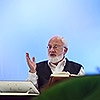Audio Version Of The Blog – 1/22/24
Listen to an Audio Version of the Blog
Download:MP3 Audio

Listen to an Audio Version of the Blog
Download:MP3 Audio

Michael Laitman on the Times of Israel: “Spirituality is not for isolated groups. It’s for humanity”
In the early mornings, I’d walk into the kitchen to find plates with leftover hummus, onions, bread and a bit of liquor. It was a place where a connection among people went beyond casual daily routines. That realization dawned on me as I delved into the wisdom of Kabbalah under my teacher, Kabbalist Baruch Shalom HaLevi Ashlag (the RABASH). Around me sat six elders, disciples of the great Kabbalah Yehuda Ashlag (Baal HaSulam), forming a small, close-knit group, almost like a mini kibbutz within the city.
This group lived a simple existence, working only as much as needed and spending the remaining hours together studying and enjoying meals. The food wasn’t the focal point; it was about the connection of hearts, an emulation of our spiritual state as a single soul vitalized by a single force of love and bestowal. Baal HaSulam dreamed of creating a kibbutz with his students to embody the way of life of what he called “the last generation”—a life of spiritual sharing and material partnership.
However, if Kabbalah describes how to reach the final destination of our lives in the shortest, most pleasant and most conscious way possible—a state of humanity’s global unity—then why establish a closed society? Should they not live among everyone? The idea was not to isolate but to build a small society, a nucleus for the united people of Israel, laying the foundation for a united nation.
Even after Rabash passed away, and we formed a group named “Bnei Baruch” (i.e., the “sons of Baruch,” referring to my teacher), there remained a persistent dream of establishing a kibbutz. We explored options across Israel, north and south, searching for a place to live simply in which we could dedicate ourselves to the teachings. However, the more we sought, the more we found the doors shut tight to this idea, and we realized that it was not meant for our generation. We needed to connect under today’s given conditions.
As we approach the last generation that Baal HaSulam described, the era of the Messiah—where “Messiah” (Heb. Moshiach) is the force that pulls (Heb. Moshech) us out of our individual egos into a unified state—unity through the establishment of a small, closed society seems like an increasingly distant idea. Instead, today the idea of unity needs to break through to humanity at large, and those who identify with the need to unite above our inborn self-serving drives form the small pioneering group in humanity that initiates such connection. That group is not located physically in a closed-off kibbutz or camp, but rather a group of desires that yearn for our more advanced, future unified state to come about, and who are willing to apply themselves in raising unity to the forefront of human values and priorities.
Essentially, the search for a closed place to conduct our study and our connection led us to wake up from a dream to the reality that the Kabbalists of our time emphasize: that today’s unity is not solely for a closed-off group, but for humanity at large, and our path to unity lies in adapting to the global conditions of our era.
[324063]
 Question: Can envy harm a person on our spiritual path? In the corporeal world envy is very harmful. How can one envy you and friends in the correct way?
Question: Can envy harm a person on our spiritual path? In the corporeal world envy is very harmful. How can one envy you and friends in the correct way?
Answer: Envy is both a very good and a very bad property. It depends on how you use it. If envy encourages you, makes you advance fast and help others, then it is good envy. Use it.
Question: Still, how can one not do harm and how can one restrict the desire to envy so as not to corrupt a person’s path and life?
Answer: Envy in a way that you adopt good properties from your friends and use them for connection with them.
[323288]
From the Daily Kabbalah Lesson 1/2/24, Writings of Baal HaSulam “And If the Way Be Too Far for You”
Related Material:
Through Envy Of Friends
Envy Is A Tremendous Force
Envying The Friends
 Question: There is a Creator on whom everything depends. There is a Creator whom we must know and feel after uniting in a group. And there is also a Creator who is inside a person. Is it all one Creator or different upper forces, each with its own purpose and potential?
Question: There is a Creator on whom everything depends. There is a Creator whom we must know and feel after uniting in a group. And there is also a Creator who is inside a person. Is it all one Creator or different upper forces, each with its own purpose and potential?
Answer: We can count a thousand so-called Creators, but all these are His actions, not Himself.
There are no upper forces except the Creator. Everything that seems to be forces acting on us arises only to mislead us. There is no one besides Him.
[323649]
From the Daily Kabbalah Lesson 1/9/24, Writings of Baal HaSulam “The Difference between Core, Self, and Added Abundance”
Related Material:
The Creator Is One, Unique, and Unified
When The Heart And Mind Unite As One
The Light Emerges In Darkness
 A real place in spirituality is called “the place of reality” since anyone who comes there to that place sees the same shape as the other (Baal HaSulam, Shamati 98 “Spirituality Is Called That Which Will Never Be Lost”).
A real place in spirituality is called “the place of reality” since anyone who comes there to that place sees the same shape as the other (Baal HaSulam, Shamati 98 “Spirituality Is Called That Which Will Never Be Lost”).
Comment: The article says that everyone who comes to this place sees the same form as the other. But we recently talked about the fact that everyone feels everything individually, in their own way.
My Response: It doesn’t matter. Just like in our world what you feel, you perceive individually. But, in principle, it is open to everyone.
Question: Let’s say we all see the table, does everyone experience it differently?
Answer: Of course in one’s own way, but we still perceive the same object. That is why it is said that there are 70 expressions. For each level, there are 70 faces of the Torah.
[323571]
From the Daily Kabbalah Lesson 1/8/24, Writings of Baal HaSulam “Spirituality Is Called That Which Will Never Be Lost”
Related Material:
In the Global Field of Mind and Feelings
The Common Field Of Thought
The Result Of Our Thoughts
 Question: Often, elephants are simply tied to a post with a thin rope. They are not in cages or shackles, yet they do not run away. Elephant owners say, “When the elephants are tiny, we tie them with the same rope. At this age, it is enough to prevent elephants from running away. And when they grow up, they believe they can’t just run away and never try to get free.”
Question: Often, elephants are simply tied to a post with a thin rope. They are not in cages or shackles, yet they do not run away. Elephant owners say, “When the elephants are tiny, we tie them with the same rope. At this age, it is enough to prevent elephants from running away. And when they grow up, they believe they can’t just run away and never try to get free.”
We are probably tied to this world with a thin “string” since childhood and do not try to escape. What kind of string is this?
Answer: Habit.
Question: Or do I know that I can’t escape?
Answer: And that, too.
Question: Which is the greater factor?
Answer: I think that I won’t be able to escape.
Question: So, this world suppresses us?
Answer: Yes, initially.
Question: Please tell me why we are afraid to take a step. We know there is freedom somewhere, but we are still afraid to take this step.
Answer: To do this, we need to overcome ourselves, that is, all our habits, our attitude toward the world, all of this must somehow be annulled.
Question: Are we afraid?
Answer: Yes, it is animal instinct, just like the elephants.
Comment: Here we have a house. We have sustenance, but who knows what will happen there? You are calling us to break out, to take this step.
My Response: It is not me who is calling, but the great sages of Kabbalah say that we need to break out of this magnetism and rise above it. And then we will see another world and ourselves differently, and in general, all of life, the entire universe.
Question: Have they taken this step?
Answer: Yes.
Question: How did they have the courage to take this step?
Answer: It is not their courage. It was given to them by nature.
It is given to certain people from above, from their inner state, their inner content. Everyone else can follow their advice and accumulate a certain amount of energy that allows them to break out of this attraction.
Comment: You try to break out of this magnetism, you follow the Kabbalists, you follow what they say, and it doesn’t work, it doesn’t work, it doesn’t work—for years!
My Response: It is accumulative. This is a process of accumulating the necessary energy and efforts that will ultimately allow us to go beyond the limits of gravity.
Question: How can you not despair because so much time has passed?
Answer: We have no other way to leave this post to which we are tied with a “string.”
Question: That is, despite the time, although despair has already set in, you continue to try to take this step?
Answer: Certainly.
Question: And still, the question is: How not to despair?
Answer: There is no other way out.
Question: Should you come to this thought that there is no other way out?
Answer: Yes, there is no other way. You will be lucky, so to speak; you will accumulate strength and break free, break the “rope,” and run like a little elephant across the field of life. And if you are unlucky, you will remain on a string until next time.
Question: Isn’t the word “lucky” offensive?
Answer: We don’t know all the world’s laws, and that’s why we say it.
Question: What will help you double or triple your strength?
Answer: That is what we are studying. This is our unification, the study of the laws of the upper world. As a result, we accumulate a certain amount of energy to break out into a free orbit.
Question: Is a group escape more remarkable than a solo escape?
Answer: Yes, most likely.
Question: But is the escape of one person also possible?
Answer: We see this in the ancient Kabbalists and even in recent times, like Baal HaSulam and others. They were able to escape from selfish, earthly gravity.
Question: Please tell me why we believe this is so. After all, we haven’t escaped yet.
Answer: Because otherwise the essence of earthly life loses all foundation.
Question: Does earthly life make sense only if we take this step?
Answer: Yes.
Question: And that is what it exists for?
Answer: Yes.
Question: So, you say the meaning of life is to take this step and break away from this “string”?
Answer: Yes.
Question: What is this space that we enter when we break away?
Answer: This is a free space in which we can act according to its laws, the laws of this free space.
Question: What are they?
Answer: This is freedom from gravity, from egoism.
Question: Is gravity egoistic?
Answer: Yes.
Question: And when I’m freed, what’s there?
Answer: Free actions, free life, free-floating. Indeed, like an elephant in the air.
Question: So now all my actions are egoistic, I am being led, and am not free here? And there?
Answer: And there you are free.
Question: I secretly want this, don’t I?
Answer: I don’t think that’s what we want.
Comment: Everyone talks about freedom and somehow imagines it.
My Response: I don’t know why he needs freedom. He doesn’t know. He just wants to get away from his “rope.” Why? Quite possibly from childish stupidity. We don’t know what’s next either.
Question: But freedom is freedom from egoism?
Answer: Yes.
[323338]
From KabTV’s “News with Dr. Michael Laitman” 11/30/23
Related Material:
How Can You Bring the Creator into this World
Nothing To Look Forward To In This World
Is it Worth Diving into This World?
 Question: Scientists have established and confirmed the following through many experiments: “When you are close to someone you care about, your breathing and heartbeat can synchronize. This is how connection is established between a baby and his or her relatives, and between those who sing in a choir. When someone you care about is not feeling well, you can just hold their hand, and it will alleviate their suffering.”
Question: Scientists have established and confirmed the following through many experiments: “When you are close to someone you care about, your breathing and heartbeat can synchronize. This is how connection is established between a baby and his or her relatives, and between those who sing in a choir. When someone you care about is not feeling well, you can just hold their hand, and it will alleviate their suffering.”
Do you believe it?
Answer: There is nothing to believe; it is so.
Question: Is that how it works?
Answer: Yes, that is how it works.
Question: What is the basis of such miracles?
Answer: Why are they miracles?
Comment: Medicine would not work, but I take a man by the hand, and suddenly he begins to synchronize.
My Response: Your inner energies begin to flow into him through tactile contact and regulate him.
Question: How does this work? Does he tune into me? The same heartbeat?
Answer: Yes.
Comment: There is a very important point here, mentioned twice: it is a “loved one.”
My Response: A loved one can be in spirit, in temperament, or in inner connection.
Question: But if he is not close to me, can I work this way with a person?
Answer: No, it is unlikely.
Question: So, closeness really matters?
Answer: Right.
Question: So, if we want to help a person who is ill, do I first need to tune myself to seeing him as someone close to me? Is it possible to tune yourself to feel close to another in order to help him?
Answer: Yes.
Question: How does this system work? How do I tune myself?
Answer: You have to feel his inner world, where he is out of balance, and try to influence him to come back to a state of balance.
Question: So are you putting the main responsibility on me now?
Answer: You are the healthy one. Well then, it is on you to do this. He can only do one thing—comply. This is not easy. But the rest of it is dictated by you.
Comment: That is, if a person asks for help, my job is to feel close to him.
My Response: To support him!
Question: Is this my job? He has to do nothing but ask.
Answer: I would say so.
Question: These are tough times for humanity, difficult. It is hard on the masses. In order to help them and bring them out of this state somehow, what should we do?
Answer: This is a problem. What can we do? To bring them out of this state is hardly for the best.
If they were put into this state, it is for a reason. We need to think how to bring them to the best state, and getting out of the descent they are in may not be the best course of action.
Question: So it is not about giving a warm hug or making someone feel good; rather, it can even be an affront?
Answer: It can be. We cannot understand this yet.
Comment: Both you and the science of Kabbalah keep saying the world is suffering. The science of Kabbalah came to help people in some way.
My Response: Precisely.
Question: To help us get out of suffering or to rise above it?
Answer: It is to rise out of suffering. Kabbalah offers us the possibility to rise by reaching out to each other and supporting each other. We do not need anything else. Only by mutual help can we lift each other up and rise together.
Question: Is this the whole science? What is hard about it?
Answer: Loving your neighbor as yourself.
Question: That is it?
Answer: That is it. Here is where we close the curtain and turn off the lights.
Comment: A person still thinks he can somehow come to this in some way.
My Response: I think not. The more I live, the more I am sure a person cannot come to this on his own.
Question: What should one do to come to “love your neighbor as yourself?”
Answer: A person must at least realize that if not for rapprochement with others, not to mention voluntarily, with one’s eyes closed, and moving toward each other as in the dark—if we do not act this way, we are all doomed.
Question: Should one suppress all resistance to such an attitude toward others? All his ego, everything he lives by?
Answer: Absolutely! That is the only way.
Comment: And the science of Kabbalah seems to say that is when the moment will come, when you rise above suffering.
My Response: Yes.
Question: But will we ever reach this?
Answer: It depends on what kind of suffering we go through. We can do it sooner or later.
Question: Is suffering the main thing here?
Answer: Suffering will force us.
Comment: That is not very optimistic.
My Response: I have never been particularly optimistic.
Comment: You have been even less optimistic about humanity lately.
My Response: I am not optimistic about humanity at all.
Comment: But you always say: “Through suffering.”
My Response: Only!
Comment: So we only understand pain.
My Response: By the stick to happiness
Question: Can we not act before then, before the bullet, before the stick?
Answer: No.
Question: Then what does this science offer?
Answer: It explains the natural laws of nature and man’s role in it. Therefore, we cannot blame nature. Blame yourself.
Question: If I learn it, will it let me act ahead of the stick or a bullet?
Answer: In the measure you want it, it will let you.
Question: So it depends on me now? I have been given a tool and it depends on me. Is it still possible to act before suffering?
Answer: Even right now!
Comment: You have just changed your angle. You said that suffering basically pushes a person.
My Response: Well, if today’s suffering is enough for you already, you can run from it toward correction and achieve the best state.
Question: So the measure is important, to be able to say: “That is enough, I have had it,” right?
Answer: Right.
[323248]
From KabTV’s “News with Dr. Michael Laitman” 11/27/23
Related Material:
A Major Illness Is Not a Sentence
How To Manage Pain
Field Of Kindness
 The common soul Adam HaRishon represents all of humanity, and its particles exist in each of us.
The common soul Adam HaRishon represents all of humanity, and its particles exist in each of us.
It is written that Adam’s soul was notionally divided into 600,000 souls. If earlier the world’s population was one million people, today it is eight billion. And this division can continue indefinitely.
From the point of view of Kabbalah, the common soul is a system of desires. In our world, desires are graded as follows: food, sex, family, wealth, honor, power, and knowledge. The totality of all desires from the smallest to the largest in Kabbalah is called the system of Adam HaRishon.
Every person has some part of the common soul, and everyone must take care to correct it from being egoistic to altruistic.
[323483]
From KabTV’s “Practical Kabbalah” 1/2/24
Related Material:
Adam Is A Collective Soul
Was There Really Adam HaRishon?
Return To The Likeness Of An Adam
 “All the commandments in the Torah that the Creator gave to Israel are written in the Torah in a general way,” in the verse “In the beginning God created,” until the verse “And there was light.” The Zohar explained that the verse “In the beginning God created” is the commandment of fear and its punishment, and all the commandments in the Torah are included in it (Zohar for All, “Rabbi Shimon’s Exit from the Cave,” #188).
“All the commandments in the Torah that the Creator gave to Israel are written in the Torah in a general way,” in the verse “In the beginning God created,” until the verse “And there was light.” The Zohar explained that the verse “In the beginning God created” is the commandment of fear and its punishment, and all the commandments in the Torah are included in it (Zohar for All, “Rabbi Shimon’s Exit from the Cave,” #188).
The most basic commandment is fear of the Creator because the entire Torah is based on it. The fear is that if you do not fulfill the commandments of the Creator, you will be rejected. Therefore, this commandment is the cornerstone.
Question: What is the connection between the phrases “In the beginning the Almighty created” and “the commandment of fear”?
Answer: The fact is that our nature is absolute egoism, and the only thing that can force us to work, do something, and bring us closer to something is fear.
That is, “In the beginning the Almighty created” is our desire to receive, constantly fearing that it will not be filled. And then it says: until the words, “and there was light.” Light is already filling.
It turns out that a person’s fear changes since there is a difference between filling: either for oneself or for the sake of the Creator.
[323438]
From KabTV’s “Introduction of The Book of Zohar” 12/24/23
Related Material:
Primordial Fear
Through The Prism Of Two Desires
There Is No Oblivion In Spirituality
Preparation to the Lesson
1st part of the Lesson — Writings of Rabash, “What Does It Mean that One Who Repents Should Be in Happiness?”
2nd part of the Lesson — Writings of Baal HaSulam, “Study of the Ten Sefirot,” Vol. 2. Part 6, “Cause and Consequence, ‘Seder Siba ve Mesubav,'” Item 31
Selected Highlights